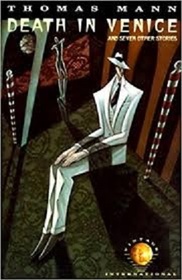Dominique Y. (NaughtyLittleMinx) reviewed Death In Venice and Seven Other Stories by Thomas Mann on + 103 more book reviews
This collection includes Death in Venice, Mario and the Magician, Disorder and Early Sorrow, A Man and His Dog, Felix Krull (the basis for a later novel), The Blood of the Walsungs, Tristan and Tonio Kruger.
Death in Venice," tells about a ruinous quest for love and beauty amid degenerating splendor. Gustav von Aschenbach, a successful but lonely author, travels to the Queen of the Adriatic in search of an elusive spiritual fulfillment that turns into his erotic doom. Spellbound by a beautiful Polish boy, he finds himself fettered to this hypnotic city of sun-drenched sensuality and eerie physical decay as it gradually succumbs to a secret epidemic. In his novella "Tonio Kroger," Mann poetically traces a young writer's struggle between bourgeois strictures and artistic genius. Skillful dialogue and language reflect the title character's emotional conflicts, especially in his wistful visit to his home town and his sentimental journey to the Baltic. In "The Blood of the Walsungs," set in turn-of-the-century Berlin, a wealthy Jewish family, modeled after the family of Thomas Mann's wife, is excoriated in a Wagnerian evening that ends in self-loathing and self-loving incest.
Death in Venice," tells about a ruinous quest for love and beauty amid degenerating splendor. Gustav von Aschenbach, a successful but lonely author, travels to the Queen of the Adriatic in search of an elusive spiritual fulfillment that turns into his erotic doom. Spellbound by a beautiful Polish boy, he finds himself fettered to this hypnotic city of sun-drenched sensuality and eerie physical decay as it gradually succumbs to a secret epidemic. In his novella "Tonio Kroger," Mann poetically traces a young writer's struggle between bourgeois strictures and artistic genius. Skillful dialogue and language reflect the title character's emotional conflicts, especially in his wistful visit to his home town and his sentimental journey to the Baltic. In "The Blood of the Walsungs," set in turn-of-the-century Berlin, a wealthy Jewish family, modeled after the family of Thomas Mann's wife, is excoriated in a Wagnerian evening that ends in self-loathing and self-loving incest.




